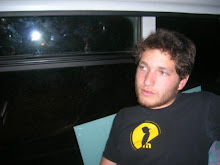Since Cedar himself was showing it followed by a conversation moderated by my former professor, Uri Cohen, I figured I should probably go. Well let's be honest, I helped publicize the event (sponsored by Columbia's Institute for Israel and Jewish Studies -- IIJS) and was even invited to dinner with Uri and Mr. Cedar the previous evening (unfortunately not until 3 hours before the reserved time and long after I was already booked for the eve) so I planned on going a long time ago. Both the film and discussion were excellent and I was not disappointed.
As per Wikipedia's summary, CAMPFIRE is "the story of a young widow, mother of two beautiful teenage daughters, who wants to join the founding group of a new religious settlement in the West Bank, but first must convince the acceptance committee that she is worthy. Things get complicated when the younger daughter is accused of seducing some boys from her youth movement." The setting is 1981 Jerusalem, in the immediate years following the Labor party's fall from 30 years of dominance in successive Israeli governments and when the country saw for the first time a corresponding rise of settlement growth with the Likud in charge. Most people today say that settlement building back then was looked at much differently, naively really, in the post-'67 generation. And no, I am not talking about the religious who justified their ideological yearnings by pulling the security card (i.e. Israel needs to settle these areas for they are strategic assets) in order to align themselves with the secular Rightist camp, I'm talking about the majority of the rest of the country who naively went along with the plan. Cedar himself spoke about how his family was 'on that bus in 1981,' how they went with a group of prospective families to scout out an area in the West Bank to see if it was suitable for a settlement's location, but in the end chose to remain in Jerusalem.
I thought Cedar's keenest comment of the discussion came in the form of a metaphor h
 e made about one of his central characters. Motke (played by the ever-excellent Assi Dayan and shown on the right), the leader of the founders of the would-be settlement, is middle aged, pot bellied, and balding. He also has an obvious comb over. Cedar noted that when Motke stands in his house and looks at a mirror at a very specific angle with very specific lighting, he appears and even truly convinces himself that he has a full head of hair, even though from every other angle and light one can obviously see the balding. Just as Motke can convince himself, so too can today's ideological settlers choose to see themselves as pure, moral, and just -- but only in the very narrowest of viewpoints. Agree or disagree with Cedar's analogy (and concomitant not-so-couched political statement), the metaphor certainly provided the audience with a striking image to ponder.
e made about one of his central characters. Motke (played by the ever-excellent Assi Dayan and shown on the right), the leader of the founders of the would-be settlement, is middle aged, pot bellied, and balding. He also has an obvious comb over. Cedar noted that when Motke stands in his house and looks at a mirror at a very specific angle with very specific lighting, he appears and even truly convinces himself that he has a full head of hair, even though from every other angle and light one can obviously see the balding. Just as Motke can convince himself, so too can today's ideological settlers choose to see themselves as pure, moral, and just -- but only in the very narrowest of viewpoints. Agree or disagree with Cedar's analogy (and concomitant not-so-couched political statement), the metaphor certainly provided the audience with a striking image to ponder.
